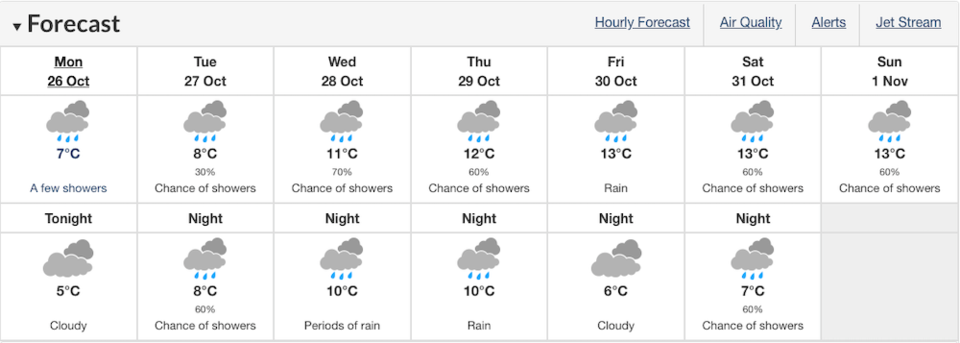Keep your umbrella handy.
While the sun is shining in Ā鶹“«Ć½Ó³»today, this week's forecast calls for plenty of precipitation.
Last Friday, places with higher elevations in Metro Vancouver saw early morning snowfall and falling temperatures. Now, the forecast is calling for a wet week, but substantially warmer temperatures.
Starting on Monday, Oct. 26, the forecast called for a few showers ending early this morning followed by a mix of sun and cloud through the day. In the evening, the forecast calls for cloudy skies and an overnight low of 5°C.
On Tuesday, the forecast calls for a 30 per cent chance of showers during the day followed by a 60 percent chance of showers at night; the overnight low will also be a few degrees milder than on Monday night, dropping to 8°C. Wednesday is expected to be wetter, with the forecast calling for a 70 per cent chance of showers during the day and periods of rain at night. Also, the warming trend continues on Wednesday, with a double-digit low overnight of 10°C.
Thursday is expected to see a 60 per cent chance of showers during the day and rain at night. And while Friday's forecast also calls for rain during the day, the evening is expected to be cloudy and dry.
Right now, Environment Canada is calling for a high likelihood of a Halloween, with a 60 per cent chance of showers forecast all day long. Sunday's forecast also calls for a 60 per cent chance of showers.
Metro Ā鶹“«Ć½Ó³»Weather Forecast
 Photo: Environment Canada
Photo: Environment CanadaThis year, Bobby Sekhon, a meteorologist with Environment Canada, says there isn't a clear prediction for the winter forecast due to a couple of competing factors.
"Right now we're seeing pretty warm sea surface temperatures out in the Pacific Ocean and that tends to kind of moderate temperatures around here, too. It doesn't allow us to get overly cold--apart from the short periods of modified arctic air like we're seeing this weekend. In general, it keeps us fairly warm, with the warm ocean nearby," says Sekhon. "But through the fall that might deteriorate as more storms come through."
This winter is also expected to be a La Niña winter, which generally means that the south coast of B.C. will see cooler temperatures throughout the winter. However, Sekhon notes that that typically doesn't come in to effect until late December or early January.



